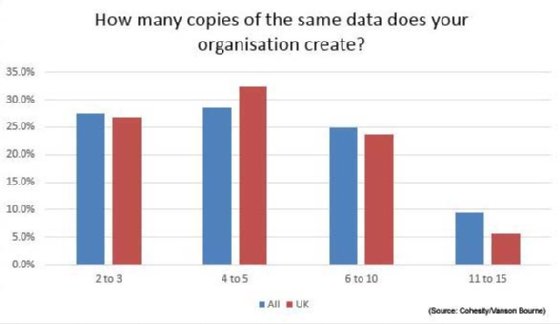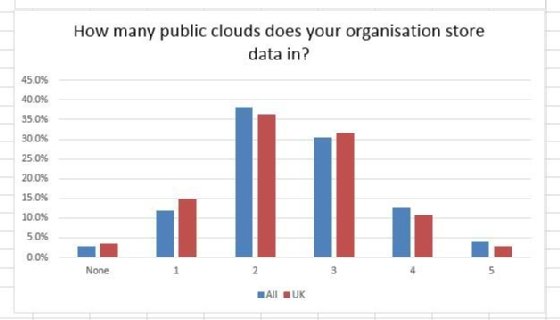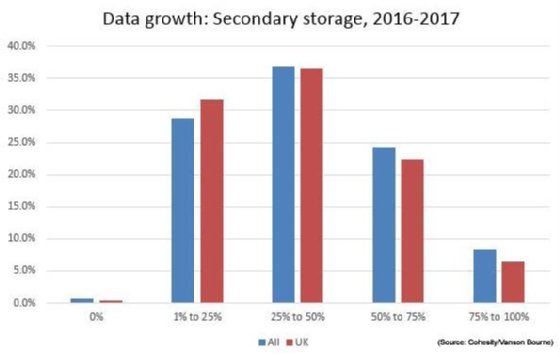
kentoh - Fotolia
Survey: Data very fragmented, and that’s a worry for most
Cohesity-sponsored survey finds most organisations store multiple copies of secondary data and worry about the cost and the effect on their competitiveness
Most UK organisations store up to 10 copies of the same secondary data, run four or five different products to manage it, and keep it in up to four locations, including two or three different public cloud storage providers.
Not surprisingly, a majority (54%) are also worried about fragmentation of their secondary – ie, not production – data.
Those are some of the findings of a survey sponsored by Cohesity, which provides scale-out data protection appliances and a data management platform.
The survey questioned 250 UK IT decision-makers as part of a study that also asked 650 of their counterparts in the US, France, Germany, Australia and Japan.
The average number of copies of the same datasets in secondary data held by UK respondents is five, and that came out the same across all countries except Japan, for which the number is seven.

The vast majority of all respondents have disaster recovery (DR) policies in place that dictate multiple copies of production data being held in separate locations. While that is the case for 92.5% of UK respondents, the US is most advanced in this regard (97.5%).
For most countries, the average number of copies of production data held as a result of DR policies is four, and in three locations.
When it came to the cloud, the average number of cloud providers with which most organisations store data in is two, although for France, Germany and Japan, it is three. Most of that data comprises databases, documents and files, and emails.

Redundant copies of data held in one public cloud is replicated most commonly to another public cloud (41% UK, 39.5% all countries), a private cloud (26.5%, 21%), or a different public cloud (24.5%, 34.5%).
As regards the increase in secondary storage data volumes in 2016 to 2017, the UK average is 38.5%, against an all-countries average of 40.5%. Similar rises are expected to the end of 2019 (38.5%, 42%).

Rather unsurprisingly, the majority of those questioned (54% UK, 48% the rest) were worried about fragmentation of their secondary data and the likelihood that they would be unable to manage it.
Key concerns include failing to meet compliance requirements, increased IT spend, the need for IT staff overtime to manage secondary data, and failure to meet service-level agreements (SLAs).
Read more on unstructured data
- NAS and object storage offer highly scalable file storage for large volumes of unstructured data, but which is right for your environment?
- Object storage: A great fit for large, unstructured datasets. In this e-guide, we walk you through the benefits and drawbacks of object storage.
It was also seen as potentially weakening their organisation’s ability to compete and to capitalise on information contained within data through effective analytics.
UK respondents said about 30% of IT teams’ time is spent managing secondary data.
The survey found the average number of systems in use by UK respondents for secondary data is five, which includes backup software and hardware, archiving platforms and disaster recovery.











